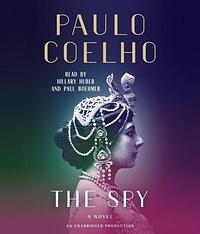Take a photo of a barcode or cover
Mata Hari really deserves better than she has been getting in the literary department. First there was Mata Hari’s Last Dance by Michelle Moran that made her inexplicably obtuse and naive considering her accomplishments. Now Paulo Coelho gives us The Spy which seems to be nothing more than a contrivance for some New Age aphorisms. He sees her as someone who was an emancipated woman, that freedom was her crime, but ignores the reality that made her “free”.
The real Mata Hari is more interesting. Margaretha Zelle MacLeod was a brave woman who fled sexual abuse and rape by a school headmaster by marrying a man she met by answering an ad. She moved with her husband to Indonesia and discovered that she went from the frying pan to the fire.
He was an abusive man whose gave her syphilis and nearly killed her on more than one occasion. His syphilis likely infected their two children. Their son died, and their daughter, Non, survived. They alleged that a nanny poisoned the children, but historians think it was a cover story as no one was charged. They divorced and she got custody but he refused to pay child support and she eventually gave her daughter back to her ex-husband because he could afford to care for her. Coelho reveals the abuse and the cheating, but ignores that she tried many “respectable” careers for women, trying to support herself and her daughter, before becoming Mata Hari. She did not leave her daughter lightly or ever forget her. She wrote to his cousin confessing that she slept with men for money, “Don’t think that I’m bad at heart, I have done it only out of poverty.”
From this desperation, she forged a career as a dancer and as woman who slept with men for money and favors. Coelho presents her as a libertine, a free-love free spirit, emancipated. She was not. In reality, she wrote, “My own husband has given me a distaste for matters sexual such as I cannot forget,” That of course is not in this book because it contradicts his story of a free woman. Reality was more complicated, a woman who did not so much choose her profession as accept it, and once accepting it, pursued it to the heights of fame and celebrity. To me it seems that using men for fame, wealth, and power came from rage at how they had used her, not vanity and greed. If greed were her motivation, she would not have tried many other occupations first.
It’s been ninety-nine years since Mata Hari was executed. As confidential documents have been declassified, the evidence make clear she was innocent, convicted as a scapegoat for military failures. World War I was a bloodbath, a war of attrition that slaughtered 60% of the men of a generation. Those who made the decisions could not pay, but a foreigner, a prostitute, a nude dancer, she could pay, and pay with her life. Her story is dramatic and oh-so-very moral. A woman transgresses and climbs high but then is brought low, punished for her transgressions, punished for being independent and greedy and vain and for sleeping around. The story of Mata Hari is pure slut-shaming.
Unless the story is real and tells the truth about where she came from, what her motivations were, and how determinedly she dragged herself up from poverty and desperation. Coelho does not do that at all. He makes it sound like she did it easily, she goes to Paris, meets the right people and she’s rich. She never misses her daughter or agonizes over her loss. She’s shallow and stupid, meeting Freud and Stravinsky and others and forgetting their first names, a name dropper who can’t remember the name…pathetic.
With her recently released letters that reveal her own thoughts about her career and her daughter, it seems inexcusable to me that she is still presented as a sexual libertine seeking fame and money, rather than the far more nuanced and complicated woman she really was. Worse, to have her struggle exploited as a vehicle for pabulum like “when we don’t know where life is taking us, we are never lost” or “an artist who desires very little and achieves it has failed in life”
Part One of the book is a letter written by Mata Hari to her lawyer and it does not feel authentic, but it is tolerable next to the histrionic letter written by her lawyer that makes up Part Two. It was only because the book is short, closer to a novella than a novel, and I was so close to finishing, that I kept reading through Part Two. Consider this gem when speaking of the injustice of her fate, “it will continue to happen until the end of time, or until man finds out he is not only what he thinks, but mostly what he feels. The body tires easily, but the spirit is always free and will help us get out, one day, from this infernal cycle of repeating the same mistakes every generation.”
I don’t recommend this book. It’s an inauthentic story by a writer who prefers to push his own philosophy rather than seek the real woman hiding behind the myth. It seems unjust that this woman who was abused her school, her husband, many men and her adopted country, used and betrayed and executed as a scapegoat continues to be exploited and abused by writers who deny her complexity and the very real grit and courage she had.
https://tonstantweaderreviews.wordpress.com/2016/12/06/the-spy-by-paulo-coelho/
The real Mata Hari is more interesting. Margaretha Zelle MacLeod was a brave woman who fled sexual abuse and rape by a school headmaster by marrying a man she met by answering an ad. She moved with her husband to Indonesia and discovered that she went from the frying pan to the fire.
He was an abusive man whose gave her syphilis and nearly killed her on more than one occasion. His syphilis likely infected their two children. Their son died, and their daughter, Non, survived. They alleged that a nanny poisoned the children, but historians think it was a cover story as no one was charged. They divorced and she got custody but he refused to pay child support and she eventually gave her daughter back to her ex-husband because he could afford to care for her. Coelho reveals the abuse and the cheating, but ignores that she tried many “respectable” careers for women, trying to support herself and her daughter, before becoming Mata Hari. She did not leave her daughter lightly or ever forget her. She wrote to his cousin confessing that she slept with men for money, “Don’t think that I’m bad at heart, I have done it only out of poverty.”
From this desperation, she forged a career as a dancer and as woman who slept with men for money and favors. Coelho presents her as a libertine, a free-love free spirit, emancipated. She was not. In reality, she wrote, “My own husband has given me a distaste for matters sexual such as I cannot forget,” That of course is not in this book because it contradicts his story of a free woman. Reality was more complicated, a woman who did not so much choose her profession as accept it, and once accepting it, pursued it to the heights of fame and celebrity. To me it seems that using men for fame, wealth, and power came from rage at how they had used her, not vanity and greed. If greed were her motivation, she would not have tried many other occupations first.
It’s been ninety-nine years since Mata Hari was executed. As confidential documents have been declassified, the evidence make clear she was innocent, convicted as a scapegoat for military failures. World War I was a bloodbath, a war of attrition that slaughtered 60% of the men of a generation. Those who made the decisions could not pay, but a foreigner, a prostitute, a nude dancer, she could pay, and pay with her life. Her story is dramatic and oh-so-very moral. A woman transgresses and climbs high but then is brought low, punished for her transgressions, punished for being independent and greedy and vain and for sleeping around. The story of Mata Hari is pure slut-shaming.
Unless the story is real and tells the truth about where she came from, what her motivations were, and how determinedly she dragged herself up from poverty and desperation. Coelho does not do that at all. He makes it sound like she did it easily, she goes to Paris, meets the right people and she’s rich. She never misses her daughter or agonizes over her loss. She’s shallow and stupid, meeting Freud and Stravinsky and others and forgetting their first names, a name dropper who can’t remember the name…pathetic.
With her recently released letters that reveal her own thoughts about her career and her daughter, it seems inexcusable to me that she is still presented as a sexual libertine seeking fame and money, rather than the far more nuanced and complicated woman she really was. Worse, to have her struggle exploited as a vehicle for pabulum like “when we don’t know where life is taking us, we are never lost” or “an artist who desires very little and achieves it has failed in life”
Part One of the book is a letter written by Mata Hari to her lawyer and it does not feel authentic, but it is tolerable next to the histrionic letter written by her lawyer that makes up Part Two. It was only because the book is short, closer to a novella than a novel, and I was so close to finishing, that I kept reading through Part Two. Consider this gem when speaking of the injustice of her fate, “it will continue to happen until the end of time, or until man finds out he is not only what he thinks, but mostly what he feels. The body tires easily, but the spirit is always free and will help us get out, one day, from this infernal cycle of repeating the same mistakes every generation.”
I don’t recommend this book. It’s an inauthentic story by a writer who prefers to push his own philosophy rather than seek the real woman hiding behind the myth. It seems unjust that this woman who was abused her school, her husband, many men and her adopted country, used and betrayed and executed as a scapegoat continues to be exploited and abused by writers who deny her complexity and the very real grit and courage she had.
https://tonstantweaderreviews.wordpress.com/2016/12/06/the-spy-by-paulo-coelho/
I had big expectations for this book but I didn't enjoy it as much as I expected. I just feel this book hasn't really looked into Mata Hari although it does have some interesting facts. I'm quite a fan of Coelho but this time I'm rather disappointed.
Mata Hari is a woman that experienced a large number of fame, trails, and tribulations. Although she was set up and was caught in "mischief;" it was sad that a woman who decided to choose herself and her sexuality get punished for living her best life. Society has a way of making examples out of the innocent or daring. Mata Hari, I salute you!
I loved learning about Mata Hari and the story used her life to portray a character that fought to leave her limited circumstances to explore the world and herself. It showed that she was a woman that was born to early and was made to pay a high price for the crimes of others. The problem I had with this book was that it felt rushed and ultimately I didn’t leave learning that much more about Mata Hari. The veil behind the mystery of her life wasn’t truly lifted. Mata Hari felt two dimensional and wasn’t more than a character. I want to learn more about the woman behind the myth.
I did truly enjoyed Coelho’s writing. It flowed so well and reminded me of why I enjoy his books so much. They constantly move me to break out of confines and to reach beyond what’s comforting to me. I love that reminder and need it constantly. Ultimately, I rated this book ⭐️⭐️⭐️.
I did truly enjoyed Coelho’s writing. It flowed so well and reminded me of why I enjoy his books so much. They constantly move me to break out of confines and to reach beyond what’s comforting to me. I love that reminder and need it constantly. Ultimately, I rated this book ⭐️⭐️⭐️.
Another exceptional biography for my year of biographies. The story is told like a series of letters reflecting events after-the-fact, with that sort of depthful perspective back you get with the time. It follows the life of Margaretha Geertruida Zelle from her privileged childhood to her abusive marriage. To escape it all, she runs away to Paris, renames herself Mata Hari, and dubs herself an exotic dancer. Through a series of manipulations and romantic encounters, she becomes rich and famous. But as her beauty fades, WWI enters Europe, and she is labeled a spy.
It is an incredible well-told tale, which one expects from Paulo Coelho. Margaretha is both a flawed and empowering person.
It is an incredible well-told tale, which one expects from Paulo Coelho. Margaretha is both a flawed and empowering person.
A história de Mata Hari fascina-me, pois considero que a verdade não corresponde inteiramente ao que nos foi contado. A realidade começa, pouco a pouco, a ser revelada. O seu casamento conturbado e violento, o divórcio que a manteve para sempre longe da filha, as razões que a levaram a prostituir-se e despir-se, tornando-se numa cortesã conhecida por toda a Europa, amante de ricos e poderosos, amada por homens e invejada por mulheres... e espia? Há quem diga que não havia provas suficientes para a condenar por espionagem, que foi incriminada.
Na minha opinião, Mata Hari não foi de todo inocente; brincou com o fogo, voou perto demais do sol... mas não merecia um fim tão trágico. O capítulo em que Paulo Coelho descreve as suas últimas horas, o momento em que desperta, calma e resignada, sabendo que não lhe foi concedido qualquer perdão e que será fuzilada nessa mesma manhã, a dignidade com que enfrenta a morte... É muito triste.
Quero saber mais sobre esta mulher tão enigmática e fascinante, cujo grande pecado foi ser livre, uma mulher à frente do seu tempo ("foi alguém que ousou desafiar certos costumes, e isso é imperdoável"). Uma feminista que trilhou o seu caminho, esperando conseguir uma vida melhor para si e, assim esperava, para a sua filha. Uma mulher cuja vida não foi fácil. Somos afinal um reflexo do mundo que nos rodeia, de como nos tratam e do que esperam de nós.
Penso que este livro deixa um pouco a desejar nesse aspeto. Fala sobre Mata Hari de forma muito enigmática, talvez demasiado; há muito que fica por contar e talvez seja um pouco difícil seguir o fio da história sem ter algum contexto prévio sobre Mata Hari e a sua época. A leitura é fácil, mas não gostei muito da escrita de Paulo Coelho, nomeadamente dos diálogos; parece-me até um pouco pretensiosa.
Na minha opinião, Mata Hari não foi de todo inocente; brincou com o fogo, voou perto demais do sol... mas não merecia um fim tão trágico. O capítulo em que Paulo Coelho descreve as suas últimas horas, o momento em que desperta, calma e resignada, sabendo que não lhe foi concedido qualquer perdão e que será fuzilada nessa mesma manhã, a dignidade com que enfrenta a morte... É muito triste.
Quero saber mais sobre esta mulher tão enigmática e fascinante, cujo grande pecado foi ser livre, uma mulher à frente do seu tempo ("foi alguém que ousou desafiar certos costumes, e isso é imperdoável"). Uma feminista que trilhou o seu caminho, esperando conseguir uma vida melhor para si e, assim esperava, para a sua filha. Uma mulher cuja vida não foi fácil. Somos afinal um reflexo do mundo que nos rodeia, de como nos tratam e do que esperam de nós.
Penso que este livro deixa um pouco a desejar nesse aspeto. Fala sobre Mata Hari de forma muito enigmática, talvez demasiado; há muito que fica por contar e talvez seja um pouco difícil seguir o fio da história sem ter algum contexto prévio sobre Mata Hari e a sua época. A leitura é fácil, mas não gostei muito da escrita de Paulo Coelho, nomeadamente dos diálogos; parece-me até um pouco pretensiosa.
informative
inspiring
mysterious
tense
slow-paced
Told through Mata Hari's final letter, THE SPY tells the unforgettable story of a woman who dared to break the conventions of her time, and paid the price.
She led a tragic life seeking to reclaim from men and officials what had been stolen from her emotionally over and over again. She tried to get back at them by becoming a strip artiste or 'exotic dancer' as they were then known, by using her body to make money enabling her to live a comfortable independent life.
This was a short interesting read as I really didn't know much about Mata Hari. I recognise the name of course from the old Greta Garbo film and old spy movies in which there would have been a Mata Hari 'type' femme fatal.
Thanks to NetGalley for the advanced copy.
She led a tragic life seeking to reclaim from men and officials what had been stolen from her emotionally over and over again. She tried to get back at them by becoming a strip artiste or 'exotic dancer' as they were then known, by using her body to make money enabling her to live a comfortable independent life.
This was a short interesting read as I really didn't know much about Mata Hari. I recognise the name of course from the old Greta Garbo film and old spy movies in which there would have been a Mata Hari 'type' femme fatal.
Thanks to NetGalley for the advanced copy.
This book was a complete cover buy. And I'll admit, I've yet to read any of Coelho's other books - this was my first. I'm impressed. The Spy is a novel about Mata Hari, written in the format of her final letter to her lawyer before execution. Her voice is quite unique, with a tendency to brag and gloss over details. So much so, that I was left wondering what part of her narrative was actual truth. The novel ends with a letter to her from her lawyer, which unveils some of her lies and glossed over details. It almost made her sound delusional. It was a nice touch for an ending, although the sudden change in tone threw me a little.
So was Mata Hari a feminist before her time, punished for living freely? It's definitely a question I want to explore a bit more, as I know quite little about her. And now I'm definitely interested in reading some more of Coelho's work.
So was Mata Hari a feminist before her time, punished for living freely? It's definitely a question I want to explore a bit more, as I know quite little about her. And now I'm definitely interested in reading some more of Coelho's work.







